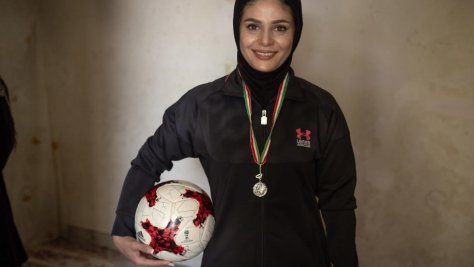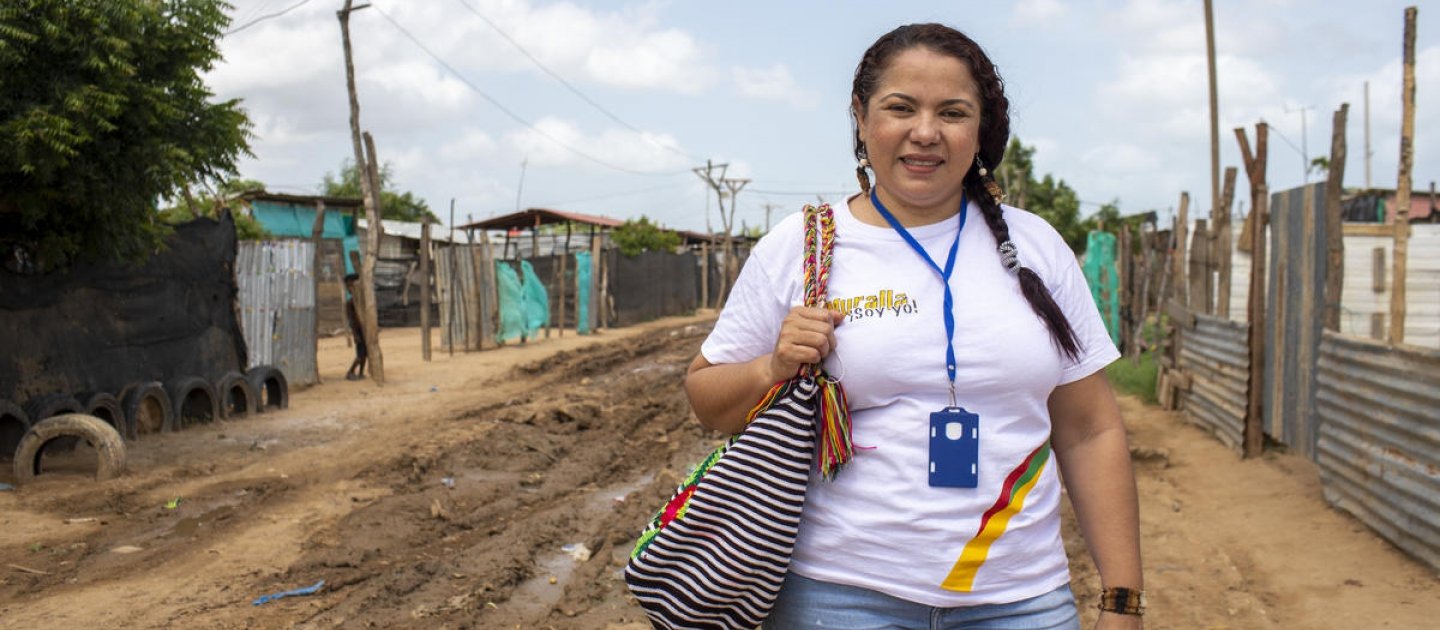We are delighted to announce that this year’s Laureate is Mayerlín Vergara Pérez.
Mayerlín (known as Maye) is a human rights activist, campaigner and the Caribbean Regional Coordinator for the Renacer Foundation, a non-governmental organization in Colombia that has been working for decades to eradicate the sexual exploitation of children and adolescents, many of whom are refugees.
Maye lives and works in Riohacha on Colombia’s northeastern border with Venezuela where she runs a rehabilitation centre for dozens of child and teen survivors of sexual violence, trafficking and exploitation. The area has seen a spike in the sexual exploitation of young people including refugees and migrants fleeing the ongoing political, human rights and socio-economic crisis in Venezuela.
What you can do to help
Donate: Give now to protect people forced to flee and reduce their risk of trafficking and exploitation.
Speak out: Take inspiration from Maye, share on social media and join the call to #EndHumanTrafficking
Attend the UNHCR Nansen Refugee Award ceremony
The ceremony is broadcast in English. Click to watch it below.
Meet the 2020 UNHCR Nansen Refugee Award Regional Winners
We are honoured to announce the Regional Winners of the 2020 UNHCR Nansen Refugee Award, each selected from more than 200 nominees for their outstanding work with refugees, displaced and stateless people.
For the first time in the history of the Award, all the selected Regional Winners are women. The overall winner of the UNHCR Nansen Refugee Award – who is not listed amongst the Regional Winners below – will be revealed on 1 October.
Each year the Laureate of the UNHCR Nansen Refugee Award is honoured at a ceremony held in Geneva, Switzerland. This year, due to COVID-19 restrictions, the ceremony will be a virtual event featuring performances by notable UNHCR supporters and addresses by leaders in the humanitarian field.
The ceremony will be broadcast in English on 5 October at 18:30 CET (which is 6 October at 00:30 HKT) on UNHCR’s YouTube channel.

AFRICA REGIONAL WINNER: Sabuni Francoise Chikunda
Francoise Sabuni Chikunda is a refugee school teacher from the Democratic Republic of Congo living in Uganda. She is the founder and chair of The Women’s Centre helping victims and survivors of Sexual and Gender Based Violence.

ASIA REGIONAL WINNER: Rozma Ghafouri
Rozma Ghafouri is an Afghan refugee living in Iran. She is an aspiring footballer using her love for sport to get refugee children off the streets and into the classroom.

EUROPE REGIONAL WINNER: Tetiana Barantsova
Tetiana Barantsova, from Ukraine is a human rights activist and the co-founder of AMI-Skhid, an NGO which advocates for change and protection of the rights of people with disabilities, including disabled internally displaced people.

MIDDLE EAST REGIONAL WINNER: Rana Dajani
Dr. Rana Dajani, a scientist and mother of four on a quest to make reading and learning accessible to refugee children. Dr. Dajani founded the We Love Reading project. The initiative aims to make books and reading accessible to children in every community including refugee camps.
Background
Formerly known as the Nansen Medal, this award is named after the late Norwegian arctic explorer Fridtjof Nansen, who was appointed by the League of Nations, predecessor of the United Nations, to be the very first High Commissioner for Refugees in 1921. The award, consisting of a commemorative medal and a US$100,000 monetary prize is given annually to an individual or organization for outstanding work on behalf of refugees.
Born in 1861, Nansen was a scientist, a diplomat, a statesman and a humanist with a deep compassion for his fellow human beings. Eager to learn, Nansen became a pioneer in the field of applied science ranging from zoology, marine biology, oceanography and geology to anthropology and sociology. While still in his twenties, he acquired fame by crossing Greenland on skis in 1889.
But it is for his pioneering work on behalf of refugees that Nansen is most fondly remembered. After the First World War, the League of Nations asked Nansen in 1920 to organize the repatriation of some 450,000 prisoners of war. He succeeded by enlisting the support of governments and voluntary agencies.
Recognized as a charismatic leader, he was made the first High Commissioner for Refugees in 1921 – a post specially created by the League of Nations. He immediately undertook the formidable task of helping hundreds of thousands of refugees to survive, to acquire legal status and to attain economic independence. For the stateless refugees under his care, Nansen created the “Nansen passport,” which was ultimately ratified by 52 countries.
The International Red Cross and a number of governments then asked him to organize a relief programme for millions of victims of the Russian Famine of 1921-1922. Nansen won the Nobel Peace Prize in 1922. He was involved in the negotiations which led to the 1923 Treaty of Lausanne between the Greek and Turkish governments and later tried to help find a solution to the Armenian crisis. Nansen died in 1930.
To promote greater interest in the refugee cause and keep alive the humanitarian spirit of Nansen, the first UN High Commissioner for Refugees, G. H. van Heuven Goedhart, instituted the Nansen Refugee Award in 1954. The award is given out yearly to a person or group deemed to have performed outstanding services in supporting refugees. The aim of the Nansen Award is to focus attention on the plight of refugees and to encourage international assistance and cooperation for them.
The monetary prize that comes with the Nansen Award is donated by the governments of Norway and Switzerland to support a refugee project of the laureate’s choice.

